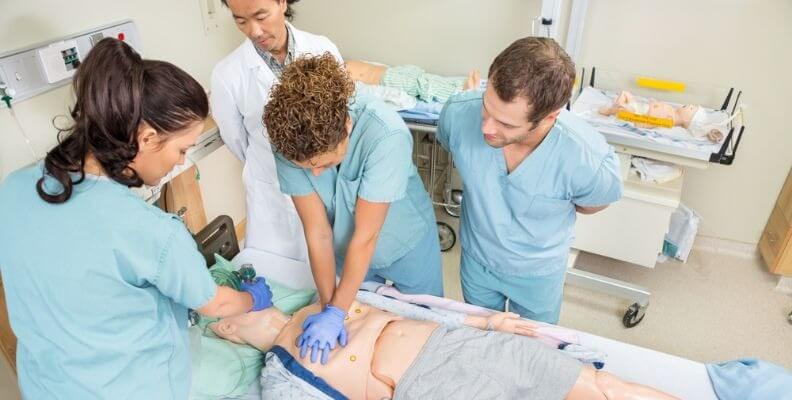What Will Nursing School Clinicals Be Like?
Nursing school clinicals are required curriculum that allows a nursing student to go into the patient care unit, either in a hospital or other patient care facility, and put the theories they have learned in the classroom and the lab into practice. Nursing knowledge moves from the academic and theoretical realms into the practical world, as a result of nursing clinicals. Nursing clinicals are one of the most valuable and engaging parts of a nursing education. Nursing students are able to go onto an actual patient unit and begin using the information that they have learned with actual patients under the direct supervision of a nursing clinical instructor. Hands-on training with patients will help nursing students learn some of the things that simply can’t be learned in a classroom like assisting a patient to the bathroom, performing assessments and administering medications and treatments.

In most nursing schools, clinicals coincide with nursing courses and count as an independent grade. Students usually have to pass a proficiency test in a simulation lab before being allowed to actually work with patients. This includes nursing procedures such as Foley catheter insertion, medication administration (shots, oral medications, enemas, etc.), and sterile wound dressing, which even during clinicals are usually in front of the instructor.
During clinicals, nursing students will generally begin with one patient and then build up from there. As a student, you will receive information about your patient, usually the day before, and then you’ll develop a treatment plan for that patient before you ever actually see the patient. Students will learn to develop a nursing diagnosis which is very different from the physician’s diagnosis. A nursing diagnosis is patient centered rather than disease centered and involves patient care rather than cure of the disease/injury. Knowing what ails the patient as well as current medications, test results, etc., will allow you to do some research and become familiar with the whole picture before you begin caring for your patient.
Beginning nursing students need to focus on absorbing information and learning as much as possible. Clinicals usually begin during the latter part of the first year in nursing school. On the days of clinicals, the nursing student will usually not have classes but will show up in scrubs at the patient care unit ready to receive orders from a direct supervisor. The skills that will be assigned for that day are skills that have been taught and practiced in nursing school. The student has had an opportunity to review the patient(s) chart before coming that day so there is a level of familiarity already present before walking into the patient’s room.
Primarily, the beginning skills will involve simple tasks like taking vital signs, assessing the patient’s condition, refilling ice pitchers, recording data, changing beds, measuring and emptying urine output when a catheter is present, etc. The goal is to familiarize the student with routine and also to help develop a sense of comfort with actually handling patients. When ill and injured people are at their most vulnerable, nurses will be performing some very personal and intimate procedures and in order to maintain professionalism and keep the patient at ease, nurses have to be accustomed to seeing people in this state. Initial clinical assignments can be quite eye opening, and help to expose nursing students to what the profession is really like.
Nursing students will do clinicals in many different settings. These include hospitals, surgery centers, nursing homes, shelters, schools and community based care facilities. The goal of this is to orient the beginning nurse to all of the varied roles in nursing. Surgical nursing is much different than pediatric nursing, recovery nursing or ER nursing. Each of these settings will allow the nursing student to experience first-hand what is expected and what the actual job is like.
Because the nursing clinical is part of your education, you won’t get paid for working those days. They are considered learning experiences for which you will receive grades. Some hospitals may offer externships to nursing students and ‘off the clock’ from school, it is possible to actually get paid for performing some of the same duties. But even though you’re not getting paid, the experience gained is invaluable and well worth the time. And, many clinical opportunities will lead to actual employment opportunities after graduation.
It’s critical to gain the academic knowledge necessary to perform the job of a nurse. But, as with all things, it’s one thing to hear the information and an entirely different thing to actually engage in the job. By going through nursing clinicals and experiencing the fast-paced but rewarding work of a nurse, students can begin to put theory into practice and become experts in their field.
Now that you know what to expect in nursing school clinicals, contact the schools below to learn more about becoming a nurse.




